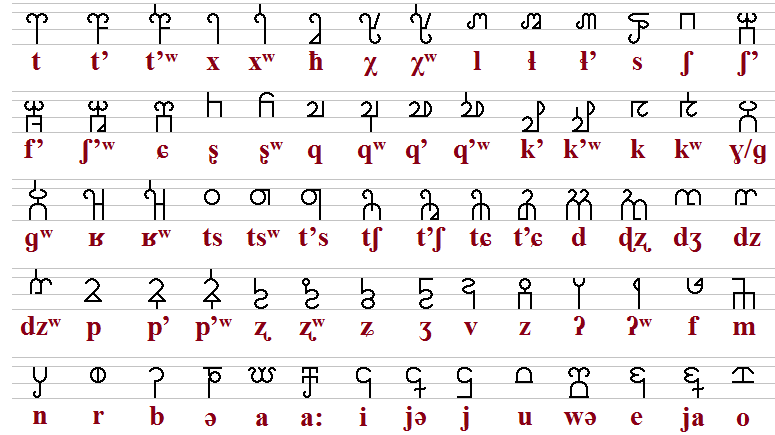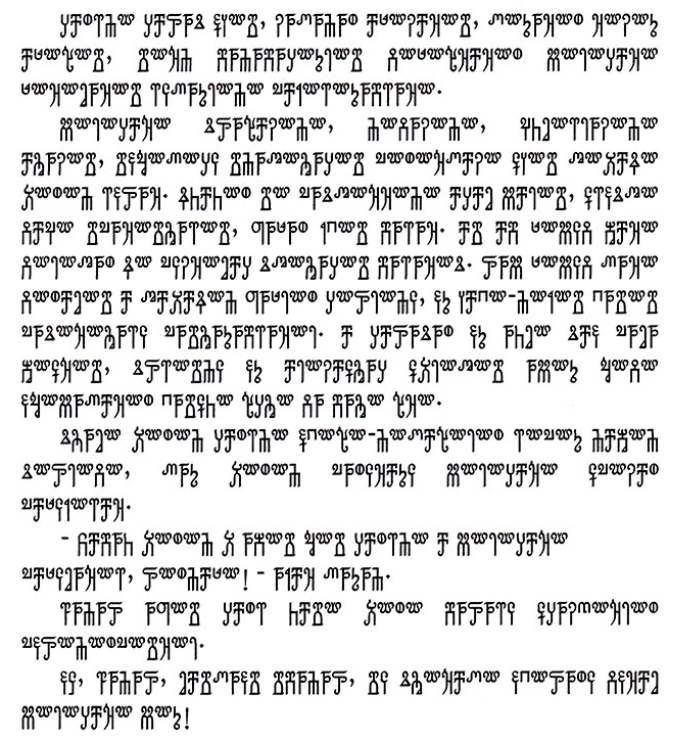

Bokmål and nynorsk without a space, yes.
An anarchist here to ask asinine questions about the USSR. At least I was when I got here. Alt accounts [email protected] [email protected]
she/xe/it/thon/ꙮ | NO/EN/RU/JP


Bokmål and nynorsk without a space, yes.


I have thought about developing an alternate script for Norwegian/Scandinavian based on the old runes, really just because I think that would be fun and interesting, but insofar as I haven’t done this yet, I don’t know of any alternate scripts for Norwegian, and obviously there isn’t much point in talking about English.
So I will instead share an alternate script for a language I do not speak: Circassian, or specifically West Circassian or Adyghe.
Father and son duo R. I. Daur and I. Yu. Daur together developed an alternate script for that language in I think 2012. The script was dubbed “Mifo-Circassian”, and as I understand it, it’s an attempt to give the Circassian language a more unique visual identity, by using letters based on old inscribed symbols — I think the emblems of clans more specifically — rather than using an adapted foreign alphabet like Latin, Arabic, or Cyrillic. Furthermore, Circassian has a very unique inventory of sounds that interact with each other in unique ways, that foreign alphabets can’t really do justice, so this alphabet is more uniquely suited for the challenges that come with representing Circassian in writing. Mifo-Circassian writing seems like it may be used both alphabetically and alphasyllabically, but the alphabetic form is far more common.
Well, “more common”, not that many Circassians actually do use this Mifo-Circassian script to begin with. Cyrillic, Latin, and Arabic have the benefit of being supported by Unicode and of also being used by neighboring languages, and they work well enough for representing Circassian. So it seems like the primary usage of Mifo-Circassian is not necessarily for communicative writing, but rather for more ornamental or artistic usage.




Honestly I would just keep self-describing as “weird” if I were you. If it really is damé to do so, then use a thesaurus; or if you’re multilingual, be a little macaronic.


Bilibili and Niconico are often called “Chinese YouTube” and “Japanese YouTube” respectively, to get the general gist of the websites across even though that isn’t quite right. These video sharing platforms are known for their danmaku subtitle/comments system, and are to some extent aimed more at anime-otaku/ACG audiences than general audiences — for instance if you use the official Bilibili app, the not-logged-in default avatar is actually a reference to the YuruYuri anime/manga.
However, while these two video sharing platforms are associated to some extent with anime/manga/video game fans, you can find all sorts of content on either platform. You’ve probably seen memes that first became popular on Niconico without realizing it.
There is some small amount of English-language content on these sites, but you’ll get a lot more out of Bilibili and Niconico if you speak Chinese and Japanese. Otherwise, Bilibili can be useful as a “backup” if YouTube ever stops working on NewPipe/PipePipe, or there’s something uploaded there that’s (no longer) available on YouTube; or Bilibili can sometimes be nice as a way to find things with Chinese subtitles if you know someone who speaks Chinese and has limited English proficiency. As said, Niconico is down right now so that isn’t very useful for anything at the moment.


Thumb-Key for keyboard here


I’ve started using PipePipe. It’s basically the same as NewPipe except it also supports Bilibili and, if it weren’t down right now, Niconico.


I’ve Been Killing Slimes for 300 Years and Maxed Out My Level is the first thing that comes to my mind. The Little Witch Academia series is also a classic.


To spare the more morbid details, I somehow got it into my head that my dad died because he’d been “poisoned by accidentally swallowing mouthwash”. And so I stopped using mouthwash because I was scared that it would kill me “too”. Eventually this came up in conversation with my mom, and she told me that I was mistaken — but I just never really got back into using mouthwash despite that reassurance. I think a part of this was just that I associated mouthwash with my dad so strongly that using it without him was too uncomfortable.


I mean, my dad dying when I was a preteen, is the thing that stands out. Pretty much everything that’s happened since then has been shaped by his death in some way, everything from my philosophy and politics, to my material hardships, to my heroes and role models, to the way I clean my teeth, to the places I’ve been and people I’ve met and media I’ve enjoyed, and even to the ways I relate to gender, family, work, nationality and language, and society in general, and that’s certainly not an exhaustive list, and all of these things go into each other as well.
I’m not sure if something so profoundly impactful on every facet of one’s life can be described as “for better or worse”, though, rather than that it simply is what it is…


TO COMMUNISTS, ANARCHISTS, OR ANYONE ELSE CALLING FOR THE OVERTHROW OF SOCIETY
THIS OBVIOUSLY ISN’T MEANT FOR YOU.
It takes either a complete lack of self-awareness or a simply incredible amount of gall to ask a yes-no question and then tell all the people most likely to answer one way to zip it. You might as well have just written “la-la-la-la I can’t heaaaar yoooou”


♫ They say in Harlan County, there are no neutrals there: you’ll either be a union man or a thug for J. H. Blair — Which side are you on, which side are you on? ♫


Put simply, in the trolley problem, my continent would pull the lever, and your continent would give drugs to the people tied to the tracks to ease the pain.


Left and right are always relative terms. I like to describe those who feel like they are or could be represented by a political party in the governing coalition of an average western liberal democracy, as the “non plus ultra” left. This comes from the old story of the Pillars of Hercules on either side of the Strait of Gibraltar, which were said to bear the warning “non plus ultra” — “nothing further beyond”. For as far as people knew back then, there truly was no land for sailors to find further to the west of that point; but now Europeans are well aware that there is a whole gargantuan continent across the Atlantic, a continent that makes the idea of the Iberian peninsula and the Maghreb as the furthest western extent of land in the world seem downright laughable.
And so those who call themselves left-wing, but who would be comfortably represented in the government of a liberal democracy… Well, they would be left-wing by the standards of the beliefs which can be comfortably represented in the government of such a country. So they’re left-wing to that extent. But in the grand scheme of things, they’re no further left of the parliamentary center compared to Marxists and anarchists, than Gibraltar is west of the Prime Meridian compared to Alaska. As I’d see it, frankly, all the beliefs which can find success in a liberal democracy, can be said to occupy the same “continent” of politics; and all those beliefs which cannot, can be said to occupy a different “continent”, and those on the former continent would certainly stand to benefit from “crossing the sea”, so to speak.

I learned this yesterday from the same video. Dr Geoff Lindsey is great.


I was raised bilingual, and speaking from my own experiences I’d say that it’s a good idea to consider the following questions if you want to maximize the child’s ability in either language:
I’m not sure if it’s a good idea to share my own story because it gets pretty melodramatic at points, but yeah, language skills need to be built and maintained over the course of one’s entire life, so you need to be able to adapt to changing circumstances. But as a whole I think that what you’re planning for your own kid sounds like it will work well, or at least decently well — the only way to know for sure is to get a time machine and go forwards 20 years, and until then I think it’s best to have faith in your competence as a parent. There’s no-one who knows a family better than itself.
And beyond that, one should also ask oneself… Well, what types of language skills does one want to see in one’s child, and what happens if the child ultimately does not reach the goals one has set? I’d say that I have sort of a nuanced or over-complicated relationship to so-called “bad grammar” because of my position.


I watch basically any channel with 100,000+ subscribers through Piped so that my views or retention or engagement don’t get counted by YouTube.


“Have these gentlemen ever SEEN a” yadda yadda


I only just realized that “ETA” in Internet comments stands for “edited to add”
Nothing is exactly set in stone (no pun intended), but my current idea essentially involves updating the letter forms to be better suited for writing on paper, and I was also thinking of using a dot diacritic for voicing and umlaut, and having the staves be x-height normally but extend downward for doubled consonants.
Ideas that are more sort of “on the table” are whether to use monographs for ⟨sj⟩ and ⟨kj⟩ etc, and monographs for the diphthongs; whether to have an optional diacritic form of ⟨r⟩ to represent the assimilation of /r/ in Eastern Norwegian; whether to use the same letters for certain sounds in complementary distribution; whether to extend the usage of the dot diacritic to alternate between otherwise similar sounds, rather than only voice and umlaut; and whether the runes should indeed have staves at all.
The problem is that depending on how many of these ideas are implemented, and the ways in which they are implemented, you eventually end up basically abandoning the idea of “modern runes” in favor of basically reinventing Shavian script but for Scandinavian. So it’s difficult to strike that sort of middle ground between ancient and modern, especially when trying to balance that with practicality of use and ease of learning. Another matter is of course which forms of runes to actually base the script on: if we stick to just Scandinavia, we have Elder Futhark, Younger Futhark, medieval runes, staveless runes, and Dalecarlian runes, and these often have very different letter forms from each other.